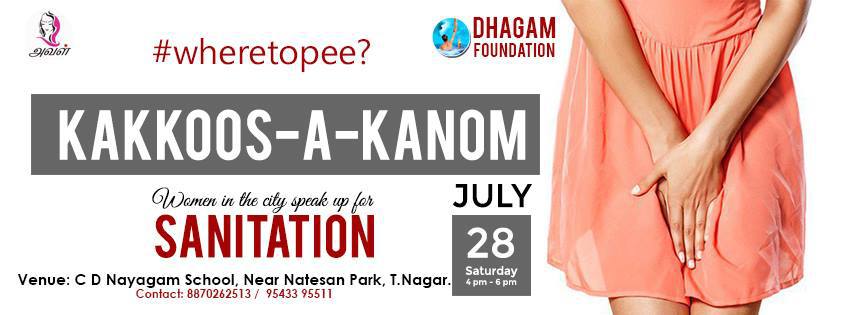The Swacch Bharat ranking released last month has seen Chennai climb to rank 100, up from a lowly 235 the previous year. While there is some reason for cheer there, realities on the ground with regard to sanitation facilities in the city are far from promising.
Chennai’s lack of public toilets has been an issue that has plagued the city for many years. With a burgeoning population, the facilities in existing toilets have also been found to be wanting. Couched in this larger issue is the oft neglected problem of absence of adequate public toilets for women in the city and issues of access and usability of the ones that exist.
Where are the toilets?
An event aimed at highlighting the discrimination faced by women in the area of sanitation and its widespread impact is set to be hosted by Dhagam Foundation on Saturday, July 28th. Kakkoos-a-kaanom (Toilets are missing) will amplify the voices of women speaking on lack of toilets and its many social effects — ranging from public health to retention rates in schools. The aim is to highlight the views of women from all walks on how the failure of civic authorities is affecting their lives.
“We have conducted a social audit of close to 500 public toilets and examined the facilities available for women. We looked at the availability and state of amenities such as buckets, mugs, lighting, water supply, sanitary napkins and disposal facilities. We have called for the formation of a Chennai Toilets Maintenance Board, an agency to be made in-charge of public toilets; right now, it is difficult to pin responsibility for an issue due to the involvement of various agencies. We hope to see many women attend the event and voice their concerns that have not been heard so far,” says Akash Madhi, a trustee of Dhagam Foundation.
Aishwarya Rao, a disability rights activist will also be speaking at the event about the near total lack of facilities in public toilets for persons with disabilities.
Speaking out
“I commute from Maduravoyal to the heart of city for college every day by bus. The state of public toilets in the city leaves a lot to be desired. I have had to go to restaurants and use their restroom as the public toilets on my way are dirty and badly maintanied. There is no concern for women and their safety. Many toilets do not even have working lights or locks,” says Anitha S, a student of Ethiraj College.
Vanessa Peters, reasearcher with Information and Resource Centre for the Deprived Urban Communities speaks about the lack of a gender lens when it comes to public projects. “We have no gender audits or gender budgeting for any of our projects. The needs of women are different and the facilities must be tailored to them. A homeless woman will have to spend close to Rs 50 – Rs 60 to get access to toilets in the city. These are considerations that do not come into the picture, even while planning for projects under Smart City.”
Citizens now hope that Saturday’s event will at least raise awareness about the issues, and have more people listen to women and their needs, which in turn can fuel some action in the area.
